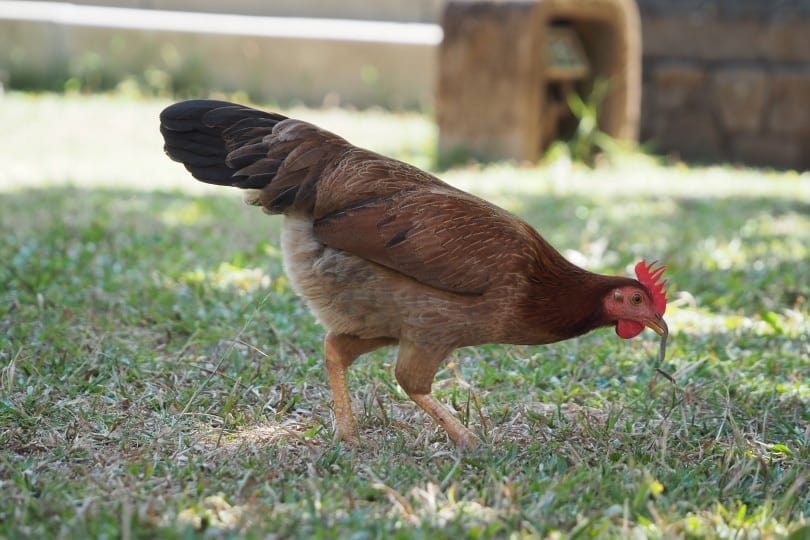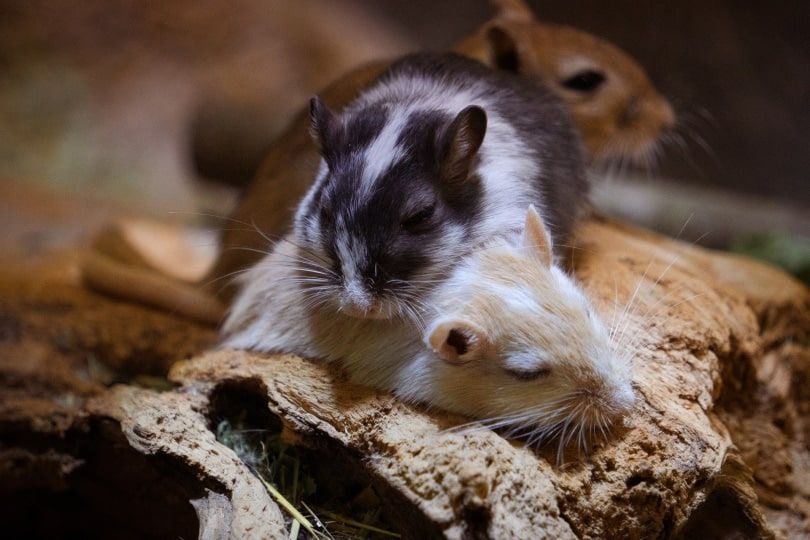Mice are renowned for hanging around coops. They’re warm and cozy, and there’s an abundance of free food and materials to build nests. While chickens won’t actively seek them out, they’ll devour mice without a second thought if one strays too close. Fortunately, chickens won’t be harmed if they eat a mouse or two.
As opportunistic omnivores, chickens eat many things that most people might not consider food. If their chicken’s diet primarily consists of scratch and kitchen scraps, many people don’t know that chickens will eat pretty much anything.
Besides mice, chickens have been known to gobble up frogs, small snakes, rats, lizards, insects, and any other creature small enough to fit in their beaks. They’ll even tear larger mice into pieces if necessary.

Why Do Chickens Eat Mice?
Chickens are opportunistic and will be more than happy to devour the occupants of a mouse nest if they stumble across one. However, they are fond of easy meals and won’t go out of their way to hunt down the mice in their coop or run, unlike an excitable hound or cat that adores seeking out rodents of all shapes and sizes.
Mice are also high in both protein and calcium, which provides extra nutritional value for hens in particular. Devouring a few mice can help your hens lay eggs with strong shells and rich yolks, making for especially tasty treats.

Is Eating Mice Dangerous for Chickens?
Eating mice won’t make your chickens sick unless the mouse itself is diseased or ate any poison that you’ve been putting out for them. It’s never recommended to use poison if you have other animals that can access it. Both your chickens and your barn cat, if you have one, will become sick if they eat rodents that have been nibbling at the poison.
There’s also the chance that your unsuspecting free-range chicken will stumble across the poison pellets and eat them too. Both devouring the poison and poison-laced rats can have a knock-on effect on you too. By eating their eggs or the birds themselves, you’ll be inadvertently ingesting rat poison.

Do Mice Bother Chickens?
Mice are more of a nuisance when they haven’t been devoured by your eager chickens. While they’ll avoid chickens when they’re awake, they’ll often pull their feathers out and gnaw on their legs when your flock is asleep.
Your chickens are surprisingly deep sleepers, and with the run of the coop, the mice will be into everything. They’ll snack on any eggs that you haven’t collected, gnaw through any cables, and even eat leftover chicken food.
Rodents can also infect your flock and you with salmonella. They carry it in both their droppings and in their mouths, so they can contaminate your chickens’ food, water, and bedding.
In certain circumstances, especially when they’re hungrier during the winter months, rats have been known to kill chicks and fully grown chickens.

How to Rodent-Proof Your Chicken Coop
While eating mice is completely normal for your chickens, if rodents become a big part of your chicken’s diet, it’s time to invest in rodent-proofing measures. Mice and other rodents can carry a variety of nasty diseases, along with ticks and fleas. They can make both you and your chickens sick, along with eating their way through the bags of food that was meant for your flock. Fortunately, rodent proofing our chicken coops isn’t hard to do.
Sealed Food Containers
One of the biggest reasons that rodents love chicken coops is the easy access to food, whether it’s eggs, baby chicks, or the scratch left on the floor. While you can’t change how warm or cozy your coop is without upsetting your chickens, you can take away the free access to the food.
Keep your bags of feed in rodent-proof containers, like metal bins that mice can’t gnaw through. Also, moving the food at night so mice don’t have access to it can help deter them.
Close Gaps
Mice can squeeze themselves into all manner of small spaces just to reach the tiniest morsel of food. Covering holes in your chicken coop with mesh — make sure it’s breathable so you don’t block ventilation holes! — will keep your coop free from mice invaders.
Barn Cat
If you don’t already have one, a barn cat is a great natural deterrent against rodents big or small. They’ll ignore both your adult chickens, their eggs, and their food while keeping watch for mice that they can eat.
Mint
Rodents have a keen sense of smell. Since it’s how they sense predators, they hate anything that inhibits that ability. Planting mint around your coop, leaving dried leaves scattered around inside, or spraying peppermint oil around is a natural way to combat an invasion of mice. It won’t harm your chickens either.
Electronic Rodent Deterrent
Consider investing in an ultrasonic rodent deterrent. These are designed to fend off rodents and other unwanted creatures by emitting a low-frequency noise. Your chickens won’t be bothered by the sound, but the rats will.
A few of the frequencies can irritate cats and dogs, though, so if you have other pets, you need to make sure they’re not affected by the noise.

Final Thoughts
As they forage, chickens eat many things. They’ll swallow lizards, insects, frogs, and even small snakes without flinching. Mice are creatures that chickens will eat, and there aren’t many reasons to be concerned if you find evidence of your flock snacking on the occasional mouse.
The biggest problem with chickens eating mice is secondhand poisoning from the rat and mouse poison that you use to control the rodent population in your coop. By eating mice or rats that have ingested the poison, your chicken can become sick as well. Not only that, but the toxin can pass through to their eggs, which means your tasty breakfast might just be poisoning you too.
Featured Image Credit: richardernestyap, Shutterstock
